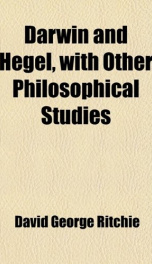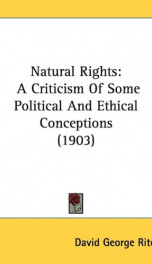darwin and hegel with other philosophical studies

Purchase of this book includes free trial access to www.million-books.com where you can read more than a million books for free. This is an OCR edition with typos. Excerpt from book: NOTE ON HEREDITY AS A FACTOR IN KNOWLEDGE. We cannot face the question of the degree to which knowledge consists in, or depends upon, inherited elements, till we know what heredity means and what things can, and what cannot be inherited : and therefore the question must be carried back from psychology into biology. This is unfortunate for the psychologist who is hasting to lay the foundations of all philosophy; but, in this matter, he must wait till the biological controversy between Lamarckian and Weismannite is settled. As to the biological question, I think it is important to distinguish between the negative and the positive part of Weismann's theory. If Weis- mann's theory of the continuity of the germ-plasm be accepted, the hereditary transmission of " acquired characters " is impossible; but apart altogether from this special theory, and without accepting any theory to explain the fact of heredity, it is possible to hold that the hereditary transmission of acquired characters is " not proven." And I shall not attempt to maintain anything more than this negative position. The onus probandi lies with those who maintain the doctrine of " Use-inheritance " (to adopt the convenient abbreviated formula suggested by Mr. W. Platt Ball). Entia non sunt multiplicanda prater necessitatem. I. In the first place, the consensus humanigeneris, though it may be an important consideration in matters of conduct, is no argument whatever in regard to a scientific belief. The very fact that the traditional pre-scientific bias is in favour of the Lamarckian theory seems to me a reason why we should be especially strict in our examination of any " facts " alleged in support of it. " The fathers have eaten 1 Originally written as part of a " Symposium" for the Aristotelian Society (London...
Info about the book
Author:
Series:
Unknown
ASIN:
B008J41D96
Rating:
3.5/5 (5)Your rating:
0/5
Languge:
English
Users who have this book
Users who want this book
What readers are saying
What do you think? Write your own comment on this book!
write a commentGenre
if you like darwin and hegel with other philosophical studies try:
Do you want to exchange books? It’s EASY!
Get registered and find other users who want to give their favourite books to good hands!




